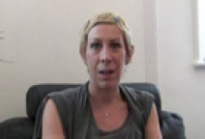Michelle - Interview 31

More about me...
Michelle was diagnosed with breast cancer a year ago and describes it as a huge shock, as there was no cancer in her family. The treatment was a mastectomy with a dorsal latissimus flap reconstruction and chemotherapy. Her consultant suspected she may carry the BRCA mutation but decided not to test her at first. She eventually was tested during her chemotherapy. As there was no family history of cancer, Michelle describes her approach to the genetic testing as ‘flippant’. She, and other family members, did not think she could possibly carry it. To find out she did was “horrendous” and Michelle describes how she has battled with the choices of preventive surgery. After much thought, Michelle chose to have her ovaries removed, a decision that she describes as worse than having her breast removed. She didn’t want to go into an early menopause and worried that she could experience depression.
Having to make the decision to have her 2nd breast and ovaries removed was much harder for Michelle than losing her 1st breast after the cancer diagnosis.
Having to make the decision to have her 2nd breast and ovaries removed was much harder for Michelle than losing her 1st breast after the cancer diagnosis.
Michelle was told that she might have the BRCA mutation only after she had completed her chemo for breast cancer.
Michelle was told that she might have the BRCA mutation only after she had completed her chemo for breast cancer.
Michelle says it's good to take control back and make choices if you find out you are a BRCA carrier.
Michelle says it's good to take control back and make choices if you find out you are a BRCA carrier.
Michelle found it helpful to talk to a genetic statistician when deciding whether to have a second mastectomy.
Michelle found it helpful to talk to a genetic statistician when deciding whether to have a second mastectomy.
I have. Yes. The, because of my age, and you know, I went to see a statistician and a genetic statistician who helped me work things out and put things into some kind of perspective for me. And sort of said, “Well look your age is this, this is the statistics of you getting it again within x amount of years. My advice is that you think about having a…. doing things… you know, you have choices,” and helped me make a decision. You know, for a long time I was battling it with that decision. You know, I’ve got a healthy, one healthy breast. I don’t want to have more surgery. It might never happen. I’m on Tamoxifen. That might keep it away. Do I really want to have surgery? Is it really going to happen again? You know, battling with, with all these things and then ultimately I’d come out the other side with, okay I’ve negotiated with myself enough now. I don’t want to take any chances now. Actually I am scared. Actually I am going to go and do it.
Michelle found her skin saving mastectomy very painful and she has decided not to have the same type of breast reconstruction next time.
Michelle found her skin saving mastectomy very painful and she has decided not to have the same type of breast reconstruction next time.
And are you having the same procedure?
Michelle's counsellor helped her through chemotherapy, whereas talking to other women with breast cancer has not always been helpful.
Michelle's counsellor helped her through chemotherapy, whereas talking to other women with breast cancer has not always been helpful.
Now I have visited a local, it’s called Chai Cancer Care. It’s near where we live offering all sorts of services for men and women who have cancer. And that’s been okay. But I have actually found that the only person who really did it for me, was this kind of, my own counsellor that I found on my own… and it didn’t really did do it for me there. I didn’t want. It didn’t do it for me. My counsellor does it for me. She, she helped me through chemotherapy, which was at the time my biggest stuff. I found that horrendous. Again it was the lack of control. I don’t do drugs. I don’t do neurofen. I don’t do harmful things in my body. To have chemo was horrendous, psychologically for me. And she’s amazing with tips. She has been the one that’s really helped me through this experience mentally. And other women have been phenomenal in terms of when they found out I wasn’t well, people in the community have offered acupuncture for free, you know, physiotherapy. People have been so amazing. So, in that respect the extended community, alternative people, and I had that. That was amazing as well.

